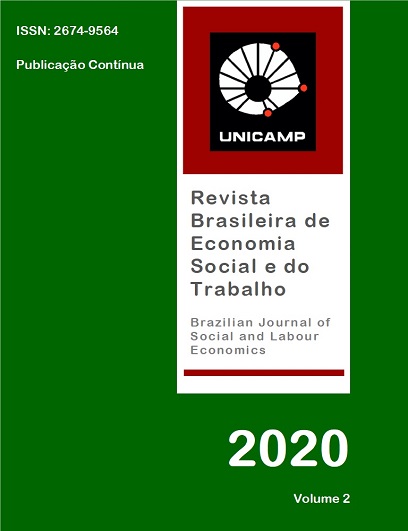Resumo
Este artigo destaca impacto do neoliberalismo no mundo do trabalho com atenção especial à Ìndia. This essay highlights the impact of neoliberalism on the world of work with particular reference to India. It provides a brief overview of the structural transformations and their impact on the growing vulnerability of workers, with particular focus on the deepening and reconfiguration of informality within the current labour scenario. The first section provides a brief profile of labour in India with a focus on the last decade. It shows how the emerging trends are marked by regional and social unevenness, with particularly adverse outcomes for women and vulnerable social groups. The second section explores different dimensions of growing insecurity of work, particularly with respect to hours of work and wages. The third section examines some of the major reasons for deteriorating conditions of work by locating in an overview of the long-term structural failures and the ascendency of neoliberal policies in the recent years. In the fourth section we follow this up by a discussion of the recent State-led labour reforms and their role in accelerating flexibilisation in the world of work and the essay closes with a very brief concluding remark regarding the contemporary labour scenario in section five.
Referências
AIMO (All India Manufacturers Organisation) (2017). Impact of demonetisation and GST: A survey. Delhi: AIMO.
CBGA (Centre for Budget and Governance Accountability) (2018). Of hits and misses: An analysis of the Union Budget 2018-19. Delhi: CBGA. https://www.cbgaindia.org/wp-content/uploads/2018/02/Of-Hits-and-Misses-Analysis-of-Union-Budget-2018-19.pdf
Chandrasekhar, C. P., & Ghosh, J. (2014). Growth, employment patterns and inequality in Asia: A case study of India. Bangkok: ILO Regional Office for Asia and the Pacific. https://www.ilo.org/wcmsp5/groups/public/---asia/---ro-bangkok/documents/publication/wcms_334063.pdf
Ghosh, J., Chandrasekhar, C. P., & Patnaik, P. (2017). Demonetisation decoded: A critique of India's currency policy. London: Routledge.
Gopalakrishnan, R. (2015). Handbook on labour law reforms in India. Geneva: ACTRAV, International Labour Organisation.
Himanshu (2018). India Inequality Report 2018: Widening gap. New Delhi: Oxfam India. https://www.oxfamindia.org/sites/default/files/WideningGaps_IndiaInequalityReport2018.pdf
ILO (International Labour Organization) (2019a). World Employment and Social Outlook: Trends 2019. Geneva. https://www.ilo.org/wcmsp5/groups/public/---dgreports/---dcomm/---publ/documents/publication/wcms_670542.pdf
ILO (International Labour Organization) (2019b). World Social Protection Report, 2017-2019. Geneva: International Labour Office. https://www.ilo.org/wcmsp5/groups/public/---dgreports/---dcomm/---publ/documents/publication/wcms_604882.pdf
Jha, P. (2005). States growing intolerance towards labour in India: A note based on recent developments. Indian Journal of Labour Economics, 48(3), 897–916.
Jha, P. (2016a). Global production network: Whats labour got to do with it. [book auth.] In A. Truger, et al. (Eds.), Monetary macroeconomics, labour markets and development: Feschschrift for Hansjorg Herr. Metropolis Verlag.
Jha, P. (2016b). Labour in contemporary India. Delhi: Oxford University Press.
Jha, P. (2017). Labour conditions in contemporary India. In P. Patnaik (Ed.), Economics: Macroeconomics [ICSSR Explorations and Surveys] (Vol. 3, pp. 302-356). Delhi: Oxford University Press.
Jha, P. (2019). Prospects for labour and contemporary capitalism: An assessment with reference to India. The Indian Journal of Labour Economics, 62(3), 319–340. https://doi.org/10.1007/s41027-019-00187-4
Kannan, K. P., & Raveendran, G. (2019, November 9). From jobless to jobloss growth: Gainers and losers between 2011-12 and 2017-18. Economic and Political Weekly, 54(44), 38–44. https://www.epw.in/journal/2019/44/insight/jobless-job-loss-growth.html
Ministry of Finance (2006). Economic Survey 2005-2006. Union Budget and Economic Survey, Government of India. https://www.indiabudget.gov.in/budget_archive/es2005-06/public.htm
Mohammad, N. (2018, May 14). How many jobs are really being created by Prime Minister's Mudra Scheme. The Wire. https://thewire.in/labour/modi-mudra-loan-scheme-job-creation-reality
NSSO (National Sample Survey Organisation) (2012). Key indicators of employment and unemployment in India (June 2011 – July 2012). Delhi: NSSO. http://mospi.nic.in/sites/default/files/publication_reports/KI-68th-E%26U-PDF.pdf
NSSO (National Sample Survey Organisation) (2014). Informal sector and conditions of employment in India (June 2011 – June 2012). Delhi: NSSO. http://mospi.nic.in/sites/default/files/publication_reports/nss_report_557_26aug14.pdf
NSSO (National Sample Survey Organisation) (2019). Periodic Labour Force Survey in India, annual report (July 2017 – June 2018). Delhi: NSSO. http://www.indiaenvironmentportal.org.in/content/464173/periodic-labour-force-survey-plfs-annual-report-july-2017-june-2018/
Patnaik, P. (2008, June 28). The accumulation process under globalisation. Economic and Political Weekly, 43(26-27), 108–113. https://www.epw.in/journal/2008/26-27/perspectives/accumulation-process-period-globalisation.html
Prasad, A. (2016). Adivasi women, agrarian change and forms of labour in neoliberal India. Agrarian South: Journal of Political Economy, 5(1), 20–49. https://doi.org/10.1177/2277976016665772
Roychowdhury, A. (2018). Labour law reforms in India: All in the name of jobs. London: Routledge India. https://doi.org/10.4324/9781351058872
Sen, T. (2017). The Code on Social Security: An exercise of deception & fraud. Delhi: Centre for Indian Trade Unions (CITU). http://citucentre.org/images/books/Code%20on%20social%20security.pdf
Tandem Research (2018). Emerging technologies and the future of work in India. [ILO Asia-Pacific Working Paper Series, June 2018], ILO Decent Work Team for South Asia and Country Office for India, Delhi.
https://tandemresearch.org/publications/emerging-technologies-the-future-of-work-in-india

Este trabalho está licenciado sob uma licença Creative Commons Attribution-NonCommercial-ShareAlike 4.0 International License.
Copyright (c) 2020 RBEST: Revista Brasileira de Economia Social e do Trabalho


